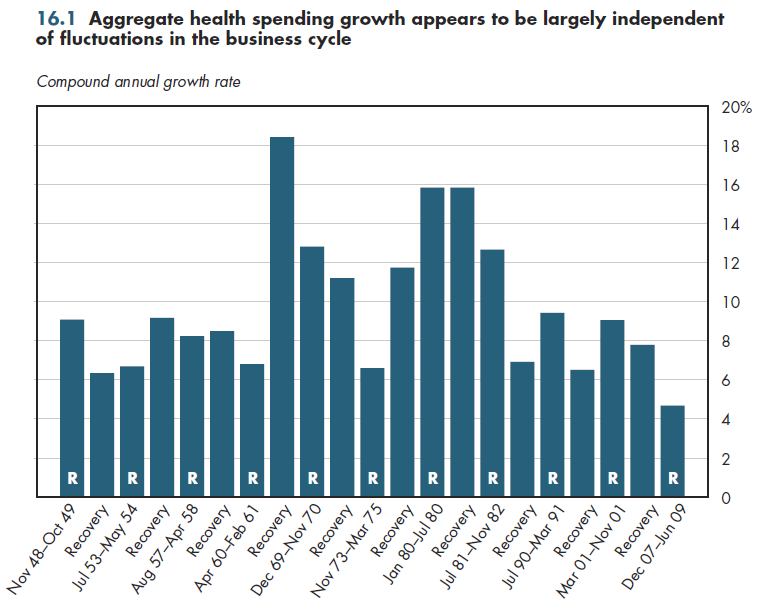Download PowerPoint versions of figure.
Inside Collection (Book): American Health Economy Illustrated
16.1 Aggregate Health Spending Growth and Business Cycle Fluctuations
Summary: Aggregate health spending growth appears to be largely independent of fluctuations in the business cycle.
Over the past 60 years, growth in health spending has persisted even during periods of economic contraction (figure 16.1). No particular pattern to its growth exists during periods of contraction relative to adjacent periods before or after a recession. During the 1990s, somewhat more regularity appeared in this pattern, with growth in health spending generally higher during downturns than during the periods that preceded or followed. Even this cycle appears to have been broken in the most recent downturn because Medicaid spending has grown less rapidly than during 2001-2007.

Unlike the unemployment rate, government spending and other key economic indicators, health expenditures are not reported monthly (a notable exception is Medicaid spending, although monthly dollars are available only with a considerable time lag). Thus, the data shown have been generated assuming a uniform monthly rate of growth between years. This assumption permits a calculation of estimated spending at the start and end of each period of downturn or recovery, but it is quite possible that growth in spending was higher or lower during the months of an economic slowdown compared with the remaining months in a given year. The picture is only an approximate gauge of how spending actually changes on a monthly basis.
During recessions, mortality due to motor vehicle accidents (because people drive less), homicides (reflecting less crime in general), and workplace injuries all decline. To the extent such mortality reductions are matched by similar reductions in mor- bidity due to motor vehicle accidents, crime, and occupational injuries, these should reduce the amount of medical spending. However, any such reduction is not apparent in the numbers shown in figure 16.1.
Downloads
References
- Author's calculations.
- Department of Commerce. Bureau of Economic Analysis.
- Department of Health and Human Services. Centers for Medicare and Medicaid Services.
Collection Navigation
- « Previous module in collection 15.3 "Medical" Bankruptcies Account for 25-35% of US Bankruptcies
- Collection home: American Health Economy Illustrated
- Next module in collection » 16.2 Medicaid Spending Tends to Be More Countercyclincal among Components of NHE
Content actions
Give feedback:
Download:
Add:
Reuse / Edit:
Twin Cities Campus:
- © 2012 Regents of the University of Minnesota. All rights reserved.
- The University of Minnesota is an equal opportunity educator and employer. Privacy
- Last modified on Sep 25, 2013 2:10 pm -0500









